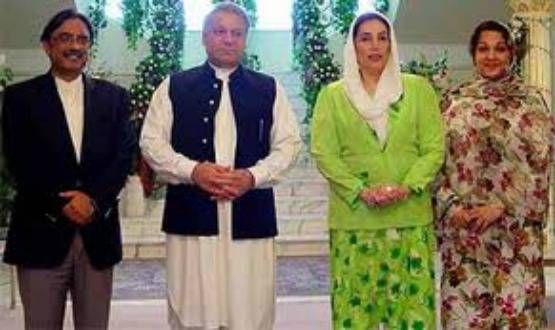It has been over ten years since the Charter of Democracy (CoD) was first signed by PPP and PML-N, and a decade later, there is still much that both parties have neglected to do in their time in power. As it turns out, one-third of the clauses mentioned within have not yet been worked on. Both parties claim that the other is the problem – the PML-N wants to revisit some clauses, while the PPP is ready to implement all of them; which begs the question as to why the latter did not try to implement legislation for all of them during its time in power? The stated excuse is the lack of an absolute majority like the one PML-N has, but convincing allies to come on board with a charter that essentially protects the democratic set-up should not have been too hard to begin with.
The CoD is a highly comprehensive document, and extends well beyond the obvious facets such as promoting civ-mil balance and not taking part in any dictatorships in the future. In a way, the document is a roadmap for signatory political parties to follow during their time in power. Issues of the inclusion of minorities, merging FATA with KPK and ensuring the rights of women are also included alongside the more commonly known tenets such as looking to increase accountability of NAB and other anti-corruption bodies and investigating the Kargil incident.
Given that the charter was drafted and signed mostly as a counter to former dictator Pervaiz Musharraf, it would be a good time to consider revising it. But after more than ten years since it was signed and eight since the parties that signed it have been in power, the fact that so much of the CoD still lies ignored is a problem that revision will not solve. Both parties have shown a lack of commitment where controversial issues are concerned – the accountability of all civil and military intelligence agencies, parliamentary oversight over the defence budget, setting up a federal constitutional court and a national democracy commission are all aspects left ignored by both PPP and PML-N during their time in power.
The ultimate aim of the charter – beyond attempting to ensure that the civilian government was not overthrown once more – was to establish parliamentary supremacy over all other state institutions. This has not happened so far. It is strange to see PPP and PML-N not assisting each other in passing legislation on the issues in the CoD, considering that both came to mutual agreement on the clauses within the charter. The CoD has often been maligned as a document that the two parties made to support each other, but this is not the case on paper – the charter is a sensible document designed to slowly grant civilian supremacy in the institutional set-up – but only if the parties spend their time in power trying to establish their writ properly.






